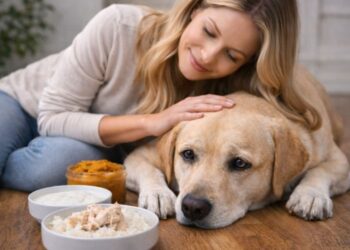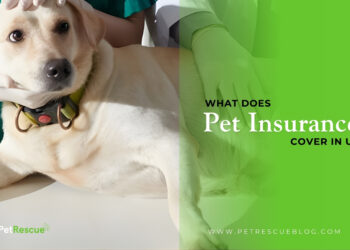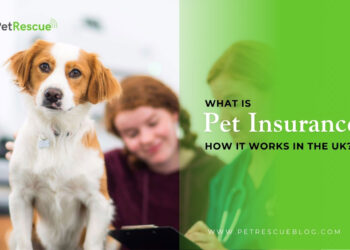Not only people are overweight, but nowadays there are also more and more dogs that suffer from obesity. About 45 percent are overweight dogs. The dog takes in more energy than it can burn, causing it to gain weight. Certain breeds are more prone to it, as are older dogs and neutered dogs. Overweight dogs run certain health risks, such as overheating, diabetes, and heart and respiratory problems.
obesity
When there is more energy in the diet than is burned, the surplus will be converted into body fat. A dog is said to be overweight when the bodyweight is up to 15% above the ideal weight. When the weight is higher than 15% of the ideal weight, we speak of obesity or fighting spirit. About 45 percent of dogs in the Netherlands are overweight. Just like in humans, it is also an increasing problem in dogs. Spayed or neutered dogs, older dogs, and certain genetically predisposed breeds such as retrievers and Jack Russells are more likely to become overweight.
Risks overweight dogs
An overweight dog has a lower life expectancy, he is often less healthy, less active, and feels less fit. If a puppy is overweight, he is more likely to develop obesity later in life. A puppy that eats too much will grow faster than is right for him and that can lead to bone and joint problems. The overweight dog is more at risk of developing the following health problems:
- Joint problems
- Diabetes mellitus
- Suffer from heat faster
- Heart and Respiratory Problems
- Bad condition skin and coat
- Liver disorders
- Greater risks in case of anesthesia during surgery
- Decreased resistance to infections
Characteristics
An overweight dog is usually bulkier. Sometimes it is clearly visible and you can feel a layer of fat on the ribs, spine, and tail base. If the ribs are difficult to feel with a flat hand, the dog is too fat. The dog is more likely to be out of breath during exercise and will be more difficult to encourage to move. Usually overweight develops gradually, so you don’t notice it because you see the dog every day. Keep an eye on your dog’s weight and weigh him occasionally. If you can’t do it yourself, weigh him when you get to the vet.
Reading suggestions; Give Your Dog A Good Place To Sleep
Causes of obesity
Overweight is usually caused by the dog getting more food than it burns. Every animal needs calories (energy) to maintain all bodily functions. This energy is obtained from food through carbohydrates, fats, and proteins it contains. The food and combustion must be in balance so that the dog maintains a good weight. Many people are inclined to give their dog extras, such as table scraps or snacks. Other causes of being overweight can include:
- Castration or sterilization that changes the hormone balance
- Thyroid and Hormone Problems
- Drug use
- Give extra food when the dog is alone
- Admit when dog begs
- Too little exercise
Make dog lose weight
If you don’t know how much weight your dog should lose, talk to a vet. Get your dog to exercise more, but do so gradually so that he has a chance to build up fitness. Improve your eating habits and avoid snacks. If your dog is begging, give him a pat as a reward, but no food. Give your dog several smaller meals a day instead of one large meal so that his blood sugar levels are more stable. Do not give your dog a special diet food, but normal food because it usually contains more fiber and energy. Go for a walk first and then feed him.
While losing weight
When your dog is losing weight, body fat is broken down and converted into energy. Body fat contains many foreign substances that cannot always be broken down. Losing weight releases these toxins and can cause detoxification symptoms. This can manifest itself in a strong shedding, thinner stools, pimples in the groin, and licking at the legs. This is a natural process and when you maintain a good lifestyle for a while, these phenomena will stop by themselves.
Types of hunger
There are two types of hunger, namely “energy” hunger and “technical” hunger. When there is a lack of readily available energy, this must be supplemented by food. The sugar level is low and it is necessary to eat or get energy from body fat to get the energy back up.
Reading suggestions; Black Dog Names; 400+ Names for Black Dogs
In technical hunger, the stomach is empty, but there is no shortage of readily available energy. There is a feeling of hunger because the stomach is empty and asks for food. Therefore, be careful with diet food that contains extra fiber, this gives more stomach filling and therefore more and more technical hunger occurs.
Mental Hunger
A dog is descended from wolves and still has the basic behavior as the wolf has. Wolves chew on something after eating a meal. That can be a stick, bones, or a piece of skin. As a result, the wolf produces substances in the brain that make it calm, called endorphins. Chewing will therefore satisfy a dog’s spiritual hunger just after eating.
Maintain weight
Once your dog has reached the target weight, it is important to ensure that your dog maintains it. Try to avoid a yo-yo effect and keep an eye on his diet. If your dog is used to not getting snacks anymore, don’t teach it. A healthy weight is better for your dog’s health and he will have a better life expectancy.








